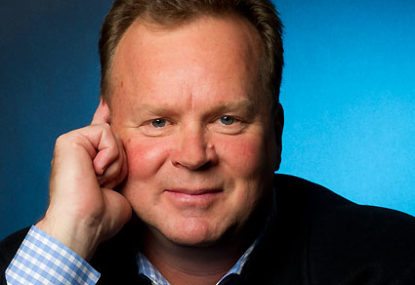As a veteran (according to The Australian) rugby journalist, I have waged a constant battle against the rugby bureaucracy, whether internationally or nationally.
The NZRU, ARU, SARU, SANZAR and the IRB have all been lined up from time to time for shots across the bow.
It is with relief and some pleasure (in anticipation, perhaps) that I can applaud the initiative of the ARU in constructing what looks to be a much-needed, viable and necessary third tier for Australian rugby.
This is an important achievement. The National Rugby Championship format, which spreads the nine teams around Australia, is about the proportion of support for rugby around the nation. There is scope for growth in the number of teams if the format is successful.
This is an important consideration. The former provincial tournament, devised by Gary Flower when he was the ARU’s chief executive, was unsustainable. It would have bankrupted the ARU if it had been allowed to continue.
John O’Neill is frequently criticised for ending this format. But if the Flower model had been kept on for a number of years, the ARU would not have been in the position it is now – able to put in place a national provincial tournament, with much of the risk carried by private or non-ARU investors.
Flower has, commendably, shown his confidence in the Bill Pulver format by assuming the chairmanship of the North Harbour Rays (Manly, Warringah, Gordon and Norths).
Judging by early comments on The Roar, the main issue with the new format is where the NSW Country team will play its matches and the role of the two great Sydney eastern suburbs clubs, Randwick and Easts, with the NSW Country team (if any).
Fox Sports has guaranteed to televise one match a week live. Presumably, some or all of the other matches will be played on Fox Sports after the event. And presumably, too, all the finals will be played live when there will be no Super Rugby to fill the schedule.
There may be scope, too, for the ABC to get involved in broadcasting some of the matches, as an addition to its coverage of club rugby. If not the ABC, then SBS.
SBS spends huge amounts of money on football coverage, presumably on the grounds that migrant and ethnic communities follow the code. There are huge British, South African, New Zealand, Islander and South American populations that follow rugby, a game played in over 100 countries, and SBS needs to consider the interests of these populations.
In announcing that the NRC will start in August and finish in early November, an 11-week tournament, Pulver said he was interested in rugby fans suggesting “law changes and match day innovations that could form part of this new competition”.
It may surprise some administrators (though this excludes Pulver), but rugby journalists are fans, too. So I am taking up the offer.
The NRC should be played under the full experimental law variations, with a view to getting these reforms adopted in total after Rugby World Cup 2015.
There should be a time-out while scrums are being set. This idea comes from Greg Growden and has a lot of merit, as scrums now consume more match time than penalties. Halfbacks should be allowed to feed the scrum immediately after it has set. If a side holds the ball in the back of a scrum to force a penalty and the ball doesn’t come out, for whatever reason, the feeding side should lose the ball under the ‘use it or lose it’ mantra.
At the 75th minute of the match, the clock should be stopped during all stoppages. This would give sides coming back into the match the time, which could be up to 10 minutes of running time, to get in front in a close match.
I wouldn’t mind, either, the trial of a new scoring system of five points for a try, two points for conversions and penalties, and one point for a field goal.
****
On the last round of the 2014 Super Rugby tournament, a pattern is emerging to suggest the Australian conference might be the strongest of the three.
The Western Force showed they can live up to their name with their victory over the surprisingly flat Chiefs. The Waratahs were impressive in defeating the Rebels, which raises the question of what has happened to the Rebels side that started the season so impressively against the Cheetahs.
For their next match, against the Force, the Rebels made six changes to their starting line. They were monstered and have not been able to recapture their first-round careless rapture.
Round 6 also showed the power of the home advantage, with all of the home sides winning. I wish I had considered this matter before making my picks.
The two most impressive wins were the Brumbies against the Stormers and the Bulls scoring two tries to one against the previously unbeaten Sharks at the bullpit of Loftus Versfeld.
The Brumbies are maturing into a formidable side. They have retained the forward power and precision Jake White instilled, while adding the Stephen Larkham aggression in attack and defence in their backline. They are now more like those great Brumbies sides under Rod Macqueen and Eddie Jones that could defeat opponents in the backs and in the forwards.
The Waratahs get their chance at the weekend to show whether they are the real deal when they play the Sharks at Kings Park, and the Chiefs will be more than tested by the rampant Bulls.
Will the home ground advantage be too much for the visitors’ pretensions to the 2014 Super Rugby championship?
Finally, in the week when the last two unbeaten sides were defeated, some gossip from my snouts in New Zealand. It appears John Kirwan is no longer enchanted with Benji Marshall’s potential magic. Marshall has picked up the vibe, apparently, and is looking for a contract to play Super League in Britain.





























































































